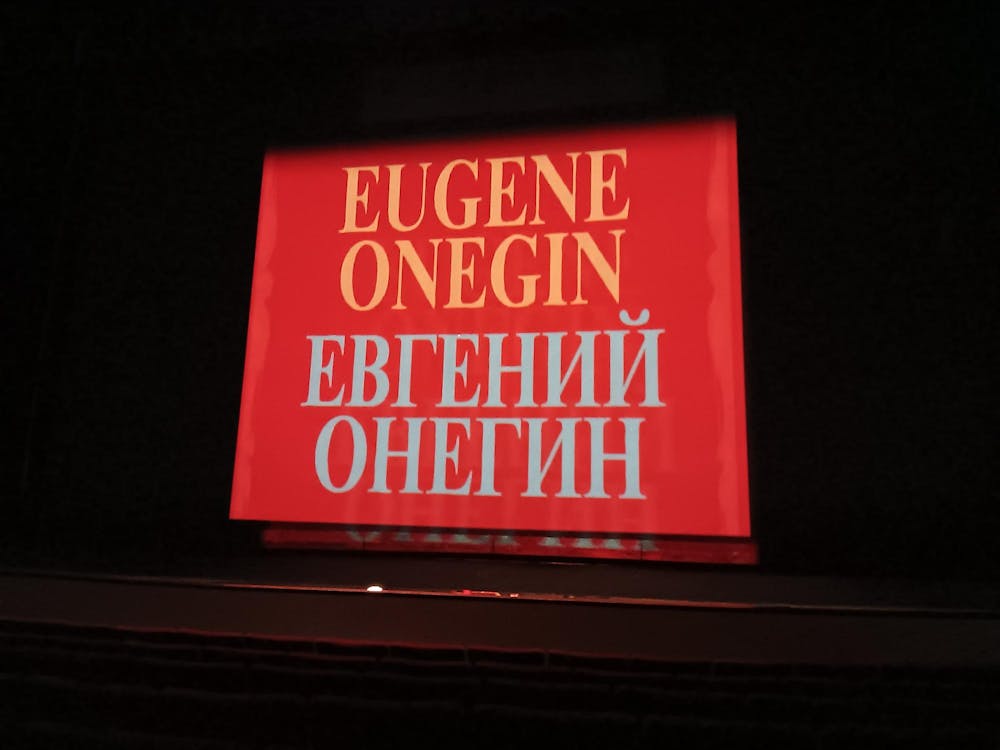Darkness descended over the Musical Arts Center stage as the house lights went down for the dress rehearsal. A red light cut through this darkness, projecting the title of the first Russian opera to be performed at the Jacobs School of Music, “Eugene Onegin.” Pyotr Ilyich Tchaikovsky wrote the music and libretto for the opera.
The Jacobs School of Music will present “Eugene Onegin” at 7:30 p.m, March 1-2, in the Musical Arts Center. The opera follows the selfish titular character who spurns the young Tatiana. When Onegin crosses paths with the now-married Tatiana years later, he realizes he loved her all along.
Guest director Jose Maria Condemi said the opera’s mastery of love and heartbreak can still speak to audiences in the 21st century.
“The story was written in the 19th century, but what hasn’t changed is the human heart,” Condemi said. “We still feel the same thing when we’re turned down, when we’re rejected and when we’re in love, so that is relevant.”
Graduate student Veronica Siebert plays Olga, Tatiana’s sister. She said the show heightened themes of interpersonal conflict through Tchaikovsky’s music.
“This show is full of a lot of intense emotions,” Siebert said. “There's a lot of really beautiful music that exemplifies that, and the roles are very interconnected.”
Siebert said Tchaikovsky’s music and the Russian language of the opera would make audiences emotional.
“I think they should come see the show because it will make them cry, and it will make them understand things about themselves,” Siebert said. “It's a really beautiful piece of art and not something we're always able to see, especially since it's in Russian.”
One relationship in the opera which shows the commonality of the human experience is that of Olga and her fiancée Lensky. Despite their engagement, Olga does not treat her fiancée well and flirts with Onegin, resulting in Lensky’s eventual death in a duel.
“I really enjoy that I've gotten to pull on my own experiences of early love to figure out how to play the character,” Siebert said. “I feel like it's something that a lot of young women can relate to, this experience of being in a new situation with relationships.”
Women and their relationships make up a large focus of “Eugene Onegin.” For example, the first scene of the opera begins with Tatiana’s mother remembering her own girlhood. She and her friend reflect on their past, and she concludes “habit replaces happiness.” Tatiana’s mother may not be in love with her husband, but she has a stable life with routine to keep her busy rather than love to make her happy.
Tatiana has a similar path to her mother: She originally dreamed of love but will marry someone she does not love for stability’s sake, just as her mother did.
However, Condemi said even though the women of “Eugene Onegin” do not marry for love, Tatiana and her mother still exhibit feminist themes; Both are strong women who turned a situation which was largely out of their control into one where they could prosper.
Graduate student Ashley Ruckman plays Tatiana. She agreed with Condemi’s ideas on feminist themes, feeling Tatiana was a strong character, unafraid to stand her ground and show her inner strength.
“I think that she stays true to herself from beginning to end and doesn’t compromise her morals,” Ruckman said. “She’s not afraid to speak her mind, especially at the end, when she’s more mature and she knows herself.”
Ruckman said she loved performing in “Eugene Onegin” and attributed Tchaikovsky’s music to heightening the emotion inherent in the story.
“It never gets boring; it never gets old,” Ruckman said. “I discover new things and new details about the music that I love every single time I hear it.”
Tickets are available at the box office or on the Jacobs School of Music website. An opera insights lecture will be held before each performance at 6:30 p.m. on the mezzanine level of the Musical Arts Center.




